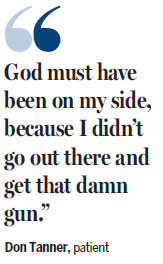Shawn Blazsek knew a string of concussions from high school football and boxing was catching up with him. He would go days without sleeping and was forgetting how to tie his shoes. Still, at age 33, he was stunned after being told he had Alzheimer's disease.
He started planning out who would take care of his four kids if something happened to his wife, and thought about how hard it would be for them when he could no longer recognize his family. So he stuffed fistfuls of sleeping pills into a bottle and wrote himself a note, vowing to swallow all of them when he wasn't able to remember the names of his children.
That day never came. Nine months later, he learned that the memory-loss center director who diagnosed him didn't have a medical or psychology license needed to do so. Then another test confirmed he did not have Alzheimer's.
He is one of more than 50 people suing the now-closed clinic's former director and its owner, saying they, too, were told they had Alzheimer's or another form of dementia. Most now know it's not true, while a few are awaiting confirmation.
Some say they spent months undergoing treatment while planning out their final years. Some quit their jobs, sold possessions or took one last special trip. One killed himself.
Blazsek crammed years of fatherly advice into a matter of months, showing his son how to check the oil on a car and teaching his wife about the household finances.
"I was preparing her to be a single mom," he said.
The couple figured he had no more than 10 years to live and even less time before his memory was gone.
"Here I am, thinking I'm going to be a widow at 43. What am I going to do?" said his wife, Jennifer. "Who's going to teach my boys how to shave? Who's going to play ball with them?"

So far, the case has yet to result in any charges against Sherry-Ann Jenkins, who opened the Toledo Clinic Cognitive Center in early 2015 through the Toledo Clinic, a multi-specialty medical center with more than 150 doctors.
The lawsuits say that Jenkins, who has a doctorate degree in physiological science, wasn't authorized to order medical tests and that her husband, a licensed doctor who is a partner in the Toledo Clinic, signed off on the tests and was sometimes listed as the referring physician on billing even though he did not see any patients.
An attorney for the couple would not answer questions about the clinic, which abruptly shut down after about a year in early 2016.
Kay Taynor was diagnosed with Alzheimer's on her second visit to Jenkins and then referred five or six friends and family members to her office, including her husband of 48 years. All were told they had the disease, she said, but her husband, Gary, took it hardest.
Suicide
He fell into depression, spending his final weeks sitting in a chair with his hands in his lap until he went into their garage and shot himself in the head, she said. An autopsy did not show any signs of Alzheimer's, she said.
Don Tanner said he, too, felt like taking his own life after his diagnosis in Feb 2015 after suffering a severe brain injury in a fall.
It wasn't until last summer - after the clinic had closed - that a new doctor told him there was no way he had Alzheimer's.
"God must have been on my side, because I didn't go out there and get that damn gun," Tanner said. "But man I thought of it."
